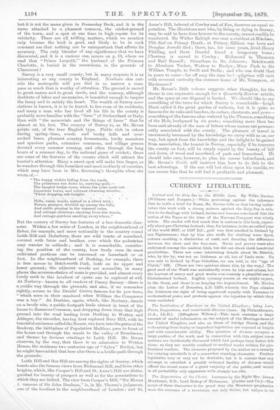character, the divine impulse being different from that communicated, to
the mind of the good man in converse with God. The preacher argues that the standpoint of the prophet, inasmuch as the vision: granted him is super-sensuous, is altogether distinct from that mental condition denominated clairvoyance, or from any of the phenomena which we associate with certain abnormal states. Dr. Moorhousei brings under review the Messianic revelation in connection with; Jewish institutions, and the whole course of Jewish. history: Referring to the objections urged by Dr. Strauss in his well- known "Life of Christ,"—namely, that the prophecy and the life wore not independent of each other, and that the correspondence between them wore first created by the authors of the Gospels,—Dr. Moorhonse quotes from Strauss's "Now Life of Jesus" words which not only amount to a modification of hts. previous statements, but " involve a conclusive condemnation of his whole theory." "With a personality," says Strauss, "of such immeasurable historical effect as that of Jesus obviously was, there cannot he a question of adaptation, or of playing a pert." Any candid reader, we think, can scarcely fail to draw the same inference, or at least to admit that Strauss has re- ceded very considerably from the position he first took up. All the more is the assumption justified, that the Incarnation can alone explain the life of the Messianic people and interpret what was meant by "Israel's hope."































 Previous page
Previous page